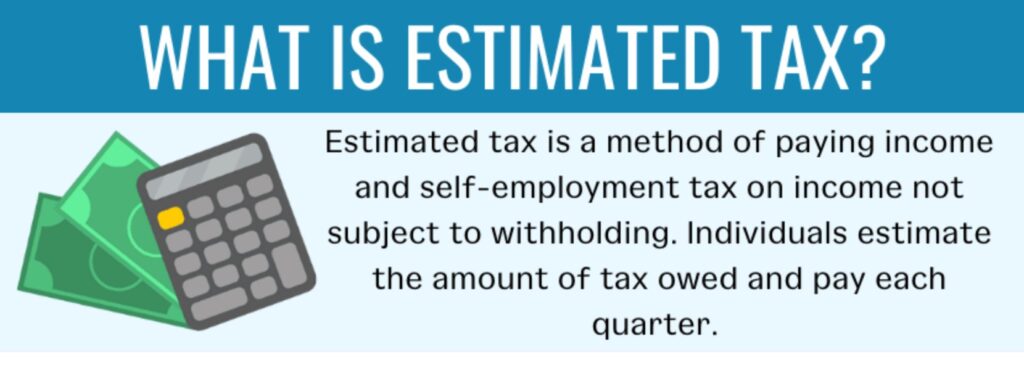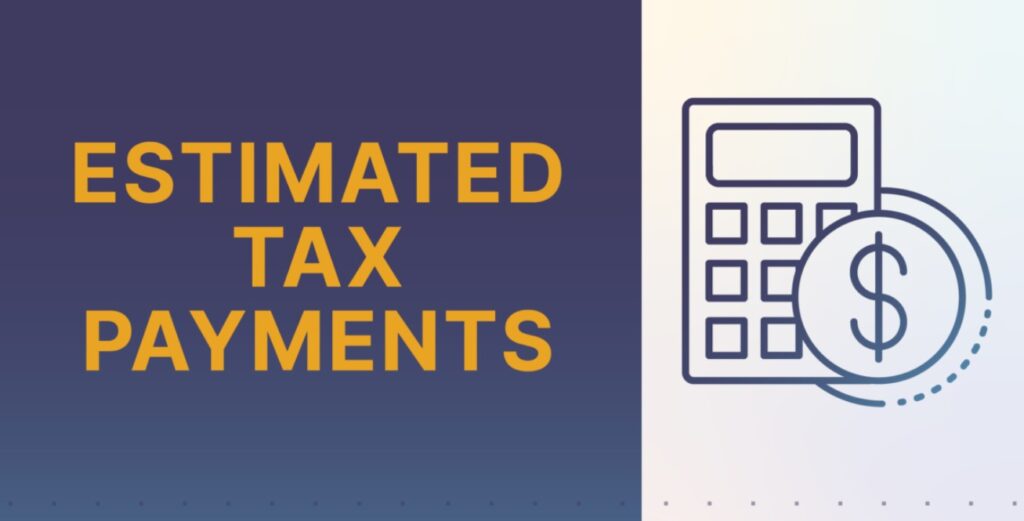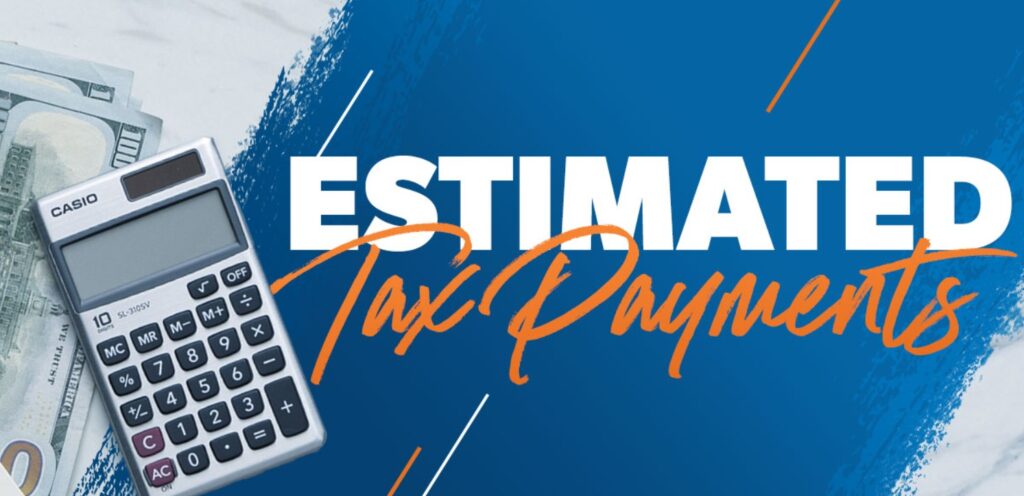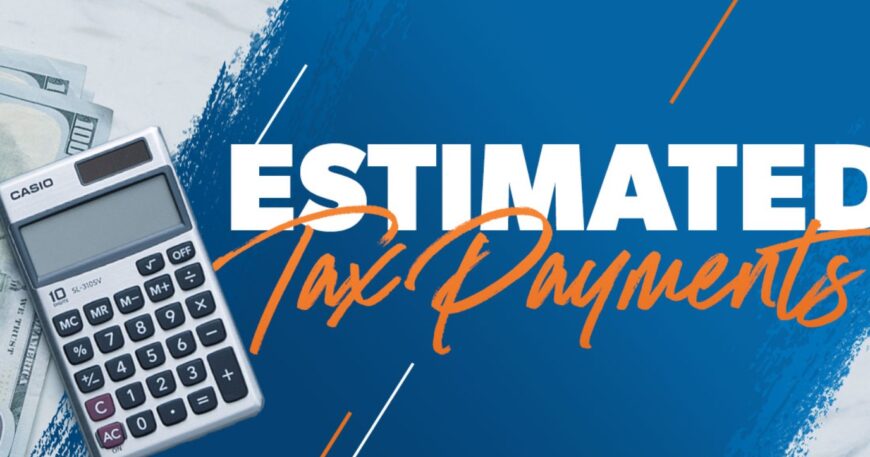Introduction
For anyone navigating the maze of taxes, understanding IRS estimated tax payment is crucial. Whether you’re a freelancer, self-employed, or simply managing your finances, keeping up with estimated tax payments can help you avoid unnecessary penalties and ensure your tax returns are filed smoothly. In this comprehensive guide, we’ll cover the essentials of estimated tax returns, due dates, IRS online payment systems, and everything you need to stay on top of your tax obligations.
What Are IRS Estimated Tax Payment?
When you are self-employed, a freelancer, or have income that isn’t subject to automatic withholding (such as interest, dividends, or rental income), you may need to make estimated tax payments to the IRS. These payments are made quarterly to cover your income taxes and self-employment taxes throughout the year.
Why Do You Need to Make Estimated Tax Payment?
The IRS requires estimated tax payments to ensure that taxes are paid regularly, rather than in one lump sum at the end of the year. If you do not make these payments, you could face penalties and interest charges. The good news is, by staying proactive and paying your taxes on time, you can avoid any surprises when it’s time to file your tax return.

How Do IRS Estimated Tax Payment Work?
Typically, you’ll need to estimate your expected income and deductions for the year. Based on these projections, the IRS will calculate how much you owe in taxes for each quarter. Your estimated tax payment is then divided into four quarterly payments, due on specific dates throughout the year. Let’s dive deeper into the payment system to understand it better.
Payment Process
- Step 1: Estimate your taxable income for the year.
- Step 2: Calculate your self-employment taxes and income taxes.
- Step 3: Divide this amount into four quarterly payments.
- Step 4: Submit payments on time to avoid penalties.
IRS Estimated Tax Payment Due Dates
One of the most crucial aspects of managing your taxes is keeping track of due dates. Missing these deadlines can result in penalties and interest fees. Here are the IRS estimated tax due dates for the current year:
- First Quarter Payment: Due April 15
- Second Quarter Payment: Due June 15
- Third Quarter Payment: Due September 15
- Fourth Quarter Payment: Due January 15 (of the following year)
Staying on top of these deadlines ensures you won’t face additional costs when you file your tax return. It’s always a good idea to mark these dates on your calendar or set reminders to ensure timely payments.
How to Make IRS Estimated Tax Payment Online
Luckily, the IRS offers an easy way to make estimated tax payments online. Here are your options:
- IRS Direct Pay: This service allows you to pay directly from your checking or savings account without any fees.
- Electronic Federal Tax Payment System (EFTPS): This system is available for individuals and businesses, offering more flexibility for paying taxes.
- Credit/Debit Cards: You can also use your credit or debit card to make payments, though a small processing fee applies.
Making payments online is not only convenient but also helps you avoid missing deadlines. Plus, it allows you to track your payments in real-time.
Understanding IRS Estimated Tax Refunds
If you’ve overpaid throughout the year with estimated tax payments, you might be entitled to a tax refund. When you file your tax return, the IRS will compare your total estimated payments with your actual tax liability. If you’ve overpaid, the IRS will issue a refund for the difference.
How Do I Know If I’m Eligible for a Refund?
You’ll likely get a tax refund if:
- Your estimated tax payments were higher than your tax liability.
- You qualify for certain tax credits.
- Your tax situation has changed, leading to a lower final tax bill.
What to Do If You Owe Taxes After Making Estimated Payments
Sometimes, despite your best efforts, you may find yourself owing taxes when you file your return. If your estimated tax payments weren’t enough to cover your tax liability, you’ll need to pay the remaining balance when you file your return.
Here’s what to do if you owe taxes:
- Pay the balance in full by the due date to avoid additional penalties.
- Set up a payment plan with the IRS if you can’t pay the full balance at once.
- Check if you qualify for any tax credits that can reduce your overall tax burden.
Common Questions About IRS Estimated Tax Payment
- What happens if I miss an estimated tax payment? Missing a payment could result in penalties and interest charges, so it’s important to stay on top of your payments. However, the IRS may waive penalties if you have a reasonable cause.
- Can I adjust my estimated tax payments mid-year? Yes, you can adjust your payments if your income changes throughout the year. This ensures you don’t overpay or underpay.
- How do I calculate my estimated tax payments? The IRS provides a worksheet to help you estimate your taxes, or you can use online tools like IRS Direct Pay.
- Can I make estimated tax payments monthly? While the IRS requires quarterly payments, you may choose to pay more frequently by dividing your quarterly amount into monthly installments.
- Can I make my payments by check or money order? Yes, you can pay by check or money order, but paying online is faster and more secure.
- Are there penalties for late estimated tax payments? If you miss a deadline, the IRS may impose a penalty based on the amount of tax due and how late the payment is.
Conclusion
Managing your IRS estimated tax payments is an essential part of staying financially organized and avoiding costly penalties. Whether you are paying online, tracking due dates, or seeking to adjust your payments, staying proactive ensures a smoother tax season. Always remember to pay on time and accurately estimate your tax liability to maximize any potential refunds. If you’re uncertain about your estimated tax return or have any questions, don’t hesitate to seek professional advice. A little planning today can save you a lot of hassle tomorrow.
How to Avoid Underpayment Penalties
When making IRS estimated tax payments, the goal is to pay as much as possible throughout the year to avoid penalties when filing your annual tax return. One common mistake is underestimating the amount due or failing to pay on time. Here are a few tips to help you avoid those costly penalties:
1. Accurately Estimate Your Income
It’s important to have an accurate estimate of your income for the year to avoid paying too little. This includes all sources of income like freelance work, investments, and rental properties. If your income fluctuates, review your payment amount every quarter to adjust for any changes.
2. Avoid Paying Less Than 90% of Your Tax Liability
The IRS requires you to pay at least 90% of your estimated taxes during the year to avoid penalties. If you fall short, they may charge you a penalty, even if you have paid a substantial amount. To make sure you’re on track, aim to pay close to or at 100% of your expected tax bill.
3. Use Safe Harbor Rules
If your tax liability is close to the amount you owed in the previous year, you might be eligible for safe harbor rules. These rules allow you to avoid penalties if your estimated tax payments are at least 100% (or 110% for higher earners) of the previous year’s liability.
4. Track Your Payments
Use IRS Direct Pay or EFTPS to ensure you have a record of your payments. Not only does this give you peace of mind, but it helps in case you need to review your payment history for any discrepancies when filing your tax return.
Understanding IRS Estimated Tax Payment Refunds
For individuals who have consistently overpaid their estimated tax payments, there is good news: you may be eligible for a refund. However, it’s important to understand that refunds won’t be issued automatically unless your tax return shows that you’ve overpaid. Here’s how the refund process works:
- File Your Tax Return: The IRS will calculate your total tax liability for the year and compare it to the estimated payments you’ve made.
- Refund Processing: If you have paid more than what you owe, the IRS will issue a refund either via check or direct deposit, depending on the method you selected when filing.
- Adjust Future Payments: If you receive a refund, it’s an indicator that you might have overpaid throughout the year. You can adjust your estimated tax payments going forward to avoid overpayment in future years.
What Happens if You Don’t Make Estimated Tax Payment?
If you fail to make estimated tax payments, the IRS may charge you both penalties and interest. The IRS expects taxpayers to pay their taxes every quarter throughout the year, and not paying can cause significant problems when tax season arrives.
Here are some consequences of not making estimated tax payments:
- Penalties for Underpayment: The IRS can impose penalties on taxpayers who don’t make the required payments. These penalties are typically calculated based on the amount of underpaid tax.
- Interest on Unpaid Taxes: In addition to penalties, the IRS charges interest on the unpaid tax. The interest rate changes quarterly, and you’ll continue to accrue interest until the tax is paid in full.
To avoid these consequences, be sure to make your estimated tax payments on time, especially if you have income from sources other than regular wages.
How Syed Professional Services Can Help You With IRS Estimated Tax Payment
Navigating the complexities of estimated tax payments can be overwhelming, especially if you’re new to self-employment or have multiple income streams. At Syed Professional Services, we offer expert tax planning and filing services to ensure you’re making the right payments and staying compliant with the IRS. Here’s how we can assist you:
1. Personalized Tax Planning
We work with you to understand your unique financial situation and help you estimate your tax obligations accurately. Our team ensures you’re paying the right amount each quarter to avoid penalties and ensure that you’re not overpaying.
2. Quarterly Payment Reminders
Staying on top of estimated tax due dates is essential to avoid penalties. We can help you set reminders for the quarterly due dates so you don’t miss a payment.
3. IRS Payment Assistance
Whether you’re paying online, through EFTPS, or via check, we guide you through the entire process to ensure that your payments are made correctly and on time.
4. Tax Return Filing and Refund Processing
We’ll help you file your annual tax return, ensuring that any IRS estimated tax refunds are properly processed. If you’ve overpaid, we’ll work with the IRS to make sure you get your refund without delay.
5. Tax Audit Support
If you’re audited by the IRS for your estimated tax payments, we’ll help you navigate the audit process and ensure your records are in order. Our professional services will ensure that any discrepancies are resolved quickly and efficiently.
Conclusion
Properly managing your IRS estimated tax payments is key to ensuring a smooth tax season and avoiding any unexpected financial burdens. By understanding the estimated tax payment due dates, making payments on time, and adjusting your payments as needed, you can maintain a healthy financial life without the worry of underpayment penalties.
For anyone struggling to navigate the complexities of tax planning, Syed Professional Services is here to help. From accurate tax estimation and timely payments to tax filing and refunds, our expert team ensures you stay on top of your tax responsibilities. If you need personalized assistance with IRS estimated tax payments, don’t hesitate to contact us.

How to Adjust IRS Estimated Tax Payment Mid-Year
Life is unpredictable, and sometimes, changes in your financial situation can affect the amount of tax you need to pay. For example, you might experience an increase in income from a new job or freelance project. Alternatively, your income could decrease due to business changes or a reduced workload. When these changes occur, it’s essential to adjust your IRS estimated tax payments to avoid overpayment or underpayment.
1. Estimating Changes in Your Income
If your financial situation changes throughout the year, you can adjust your quarterly payments. For example, if you expect a lower income due to reduced hours or freelance work, you may not need to pay as much. Conversely, if your income increases unexpectedly, you may need to increase your estimated tax payments to avoid any surprises when it’s time to file.
2. Use IRS Tools for Adjustments
The IRS provides tools like the Estimated Tax Worksheet and the Tax Withholding Estimator to help you calculate and adjust your payments. If you’re unsure about how to proceed, seeking advice from a tax professional can help guide you through the process and prevent any issues with underpayment penalties.
Why Choose Syed Professional Services for Tax Management
At Syed Professional Services, we are dedicated to providing personalized tax planning for individuals and businesses alike. Our experienced team can guide you through the complexities of IRS estimated tax payments, tax filing, and everything in between. Here’s why you should consider partnering with us:
1. Expert Tax Knowledge
Our tax professionals are experienced in dealing with IRS estimated tax payments and have extensive knowledge of the IRS guidelines and regulations. We ensure that your tax filings are accurate and timely.
2. Customized Services
We understand that every taxpayer’s situation is different. Whether you’re a freelancer, small business owner, or investor, we offer customized solutions to meet your unique tax needs. We’ll help you stay on top of estimated tax payments and avoid unnecessary penalties.
3. Year-Round Support
Tax management isn’t just about filing at the end of the year. At Syed Professional Services, we provide ongoing support to help you throughout the year, ensuring that your taxes are properly calculated and paid on time. We also provide proactive advice on IRS estimated tax refunds and strategies to minimize your tax burden.
4. Accurate Record Keeping
One of the most important things about making estimated tax payments is keeping accurate records. We help you maintain detailed records of all your payments, ensuring that you have everything you need when it’s time to file your tax return. This helps avoid discrepancies and ensures that you are fully prepared if you’re audited by the IRS.
The Role of Tax Deductions and Credits in Estimated Tax Payment
Did you know that tax deductions and credits can affect your estimated tax payments? By understanding and applying eligible deductions and credits, you can reduce the amount of taxes you owe. This can result in lower estimated tax payments and possibly a higher tax refund when you file your return.
1. Tax Deductions
Common tax deductions include business expenses, student loan interest, mortgage interest, and contributions to retirement accounts. By including these deductions in your calculations, you can reduce your taxable income and the amount of taxes you need to pay.
2. Tax Credits
Unlike deductions, which reduce your taxable income, tax credits directly reduce the amount of tax you owe. Popular credits include the Earned Income Tax Credit (EITC), Child Tax Credit, and Education Credits. These can significantly lower your estimated tax liability.
By working with Syed Professional Services, we can ensure you take full advantage of these tax deductions and credits, ultimately lowering your estimated tax payments and maximizing your tax refund.
Potential Penalties for Underpayment of Estimated Taxes
Even if you try to pay your taxes diligently, you could still face penalties if your estimated tax payments fall short. Here’s a breakdown of the most common penalties related to underpayment:
- Late Payment Penalties: If you fail to make a timely estimated payment, the IRS may impose a penalty on the underpaid amount.
- Interest on Underpaid Amounts: In addition to penalties, the IRS charges interest on any unpaid tax amounts. The rate is updated quarterly and can add up quickly.
- Accuracy-Related Penalties: If your tax return or payment is inaccurate, or you miscalculate your estimated taxes, you could be penalized.
To avoid these penalties, it’s essential to make accurate, timely payments throughout the year. If you’re unsure about how to calculate your payments, Syed Professional Services is here to help.

IRS Estimated Tax Payment Myths Debunked
There are several myths about IRS estimated tax payments that could confuse. Let’s clear up some common misconceptions:
Myth 1: “I Only Need to Pay Estimated Taxes If I’m Self-Employed”
While self-employed individuals are more likely to need to make estimated tax payments, anyone with income that isn’t subject to automatic withholding may need to pay estimated taxes. This includes people with interest income, rental income, or freelance income.
Myth 2: “If I Overpay, I’ll Get a Refund Automatically”
You may overpay throughout the year, but the IRS will not issue a refund unless you file a tax return that shows you’ve overpaid. Simply paying more doesn’t guarantee a refund.
Myth 3: “I Can Avoid Penalties by Paying My Taxes All at Once”
The IRS expects estimated tax payments to be made quarterly. Paying all your taxes at once or just once at the end of the year could result in penalties.
Final Thoughts on IRS Estimated Tax Payment and Refunds
Navigating IRS estimated tax payments is an essential part of staying on top of your finances and avoiding penalties. Whether you’re a freelancer, business owner, or someone with other income sources, it’s important to ensure that you’re making accurate payments throughout the year.
By working with Syed Professional Services, you can receive expert assistance in managing your estimated tax payments, making timely payments, and securing the maximum refund possible. Our team will guide you through the process and help you navigate complex tax laws to ensure your peace of mind.
If you need assistance with IRS estimated tax payments or have questions about your tax situation, don’t hesitate to reach out to Syed Professional Services. We’re here to help!



